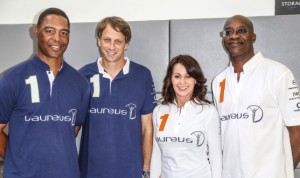The panel Sport for Development: Affecting Societal Change will dive in to how organizations can combine the power of sports and its ability to engage a fan base with their corporate social responsibility efforts. This panel will consist of Dave Mingey, President and Founding Partner at GlideSlope, Joey Cheek, Olympic Athlete, Matt Geschke, Director at Laureus Sport For Good Foundation, and Paul Teeple, Director, Sport for Development at Partners of the Americas. Each of these panelist will bring a unique perspective to the conversation about their experiences with Sport for Development, and how they see Sport for Development impacting the marketing mix as more organizations begin to utilize the concept. For this panel preview, I had the opportunity to speak with a few members of the GlideSlope team to get some background and insight on Sport for Development.
Q: People attending SXsports might be unaware of Sport for Development. Could you briefly define the concept and how it came about?
A: Sport for Development is a term that describes the use of sport as a tool to drive both business and societal impact. This emerging field has been gaining traction as more people begin to understand the power of sport to illuminate issues in society. From a focus on spending and sustainability raised by Olympic bidding, to domestic violence being at the front and center of this past NFL season, to LGBT activism around the Sochi 2014 Games, to A-rod’s doping scandal, to the rising worldwide physical inactivity crisis, sport is at the heart of some of our most pressing global issues. Sport not only sheds light on these issues, but can be a vehicle for positive change within them.
Sport for Development (SFD) programs use sport to provide education, awareness, and assistance around such topics. These types of programs gained international recognition over the past 20 years via major proponents like the United Nations Office on Sport for Development and Peace and the International Olympic Committee.
Here is a video of the first-ever International Day of Sport for Development and Peace. Olympians, international leaders and young people speak abot how sport unites and inspires; how it can break barriers and make a real difference in communities and countries across the world.
Q: Why is it important for organizations to utilize SFD? And how do they implement SFD in to their current marketing mix?
A: SFD allows brands to maximize their sponsorship dollars by rerouting some funds to support broader corporate social objectives while achieving marketing efforts. When done effectively, involving sport for development activities in sports sponsorships can provide tremendous value to brands—brand awareness, consumer engagement, corporate reputation lift and so forth—and key to that success is the perception of authenticity. Pairing sports sponsorships with SFD partnerships, particularly at the grassroots level, can help brands appear as more authentic omni-present sports partners.
Q: Why do you feel sports organizations treat their marketing activities and corporate social responsibility efforts separately?
A: Traditionally marketing and CSR live separately within organizations. Internal silos cause a disconnect between these two departments. This is true of sports marketing as well. However, nowadays, the concept of CSR is so universally adopted (and consumers are demanding it) that it must become more integrated. The marketing teams have dipped their toes in social responsibility via campaigns or a donations that are attached to a specific sports sponsorship, however those funds are applied towards what the property cares about not the brand.
SFD provides an opportunity for these two sides of the house to come together to effect significant and long-term change through sport, and to focus this change on issues that the company cares about. Yes, this requires a greater commitment from a brand – organizationally, strategically and from a resource perspective – but the impact can yield far greater returns for both the participating business and the targeted community.
Q: Do you have examples of organizations that are effectively using the SFD concept?
 A: One great example is the Mercedes-Benz USA and Laureus Sport for Good Foundation partnership. Together they have worked to fund and implement sport-based youth development programs in underserved neighborhoods of major US cities. With the help of high-profile athletes such as Tony Hawk and Michael Johnson as well as the 650 coaches trained by Up2Us’ Coach Across America program, MBUSA and Laureus provide meaningful experiences through sports that teach tangible skills for success. The program engages the Mercedes-Benz dealerships and directly impacts the communities in which they operate. Laureus is represented on this panel as well and will speak to the effectiveness of the Mercedes-Benz’s program.
A: One great example is the Mercedes-Benz USA and Laureus Sport for Good Foundation partnership. Together they have worked to fund and implement sport-based youth development programs in underserved neighborhoods of major US cities. With the help of high-profile athletes such as Tony Hawk and Michael Johnson as well as the 650 coaches trained by Up2Us’ Coach Across America program, MBUSA and Laureus provide meaningful experiences through sports that teach tangible skills for success. The program engages the Mercedes-Benz dealerships and directly impacts the communities in which they operate. Laureus is represented on this panel as well and will speak to the effectiveness of the Mercedes-Benz’s program.
Friday, March 13
12:30PM – 1:30PM
Four Seasons
Ballroom CD
98 San Jacinto Blvd
